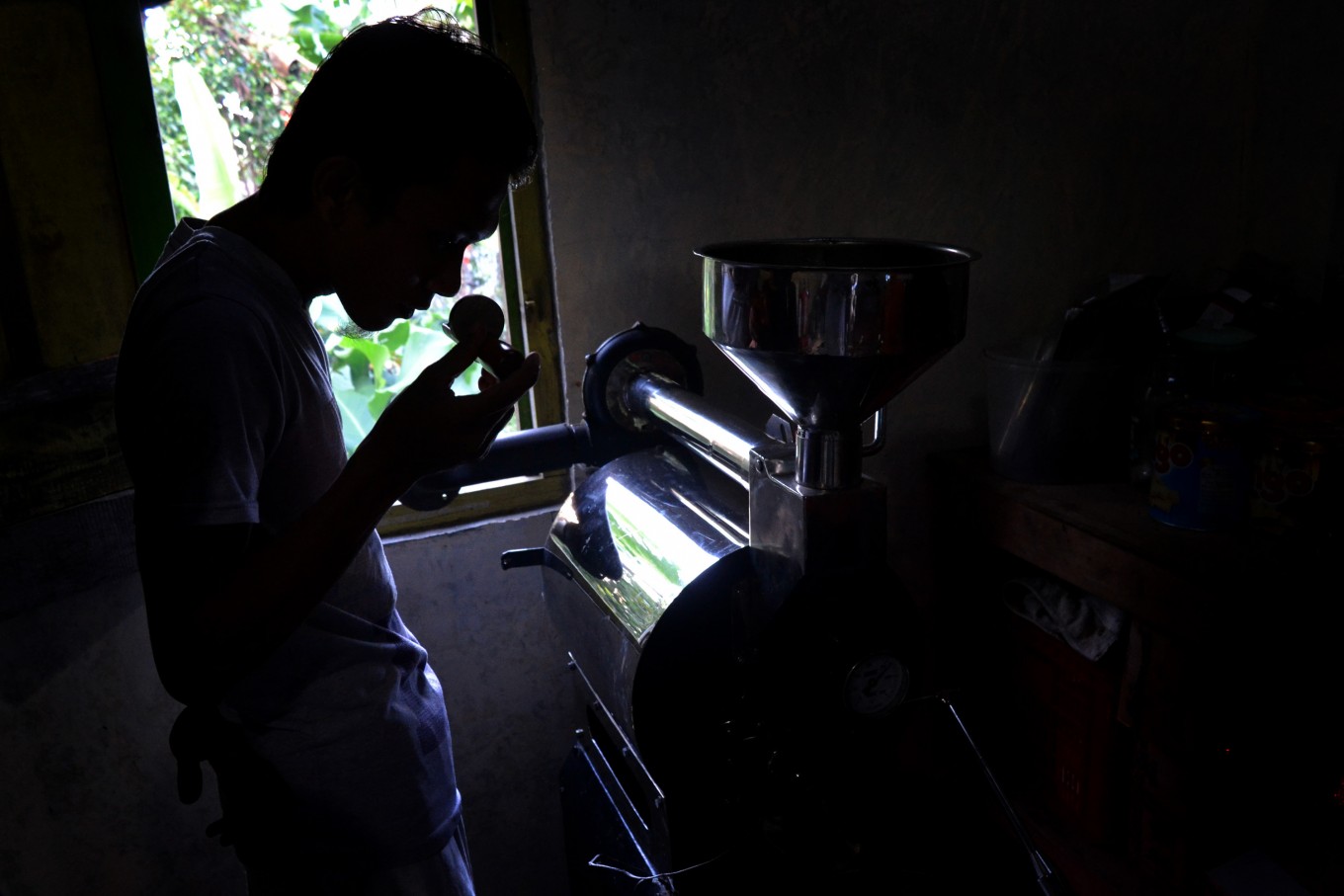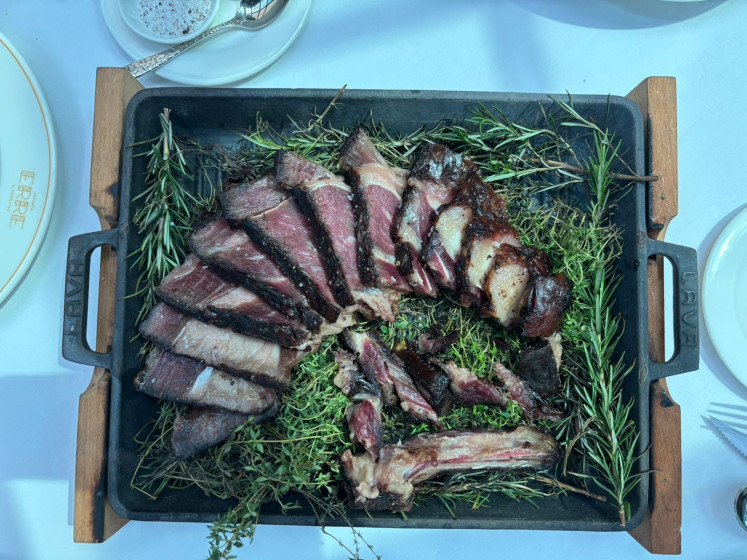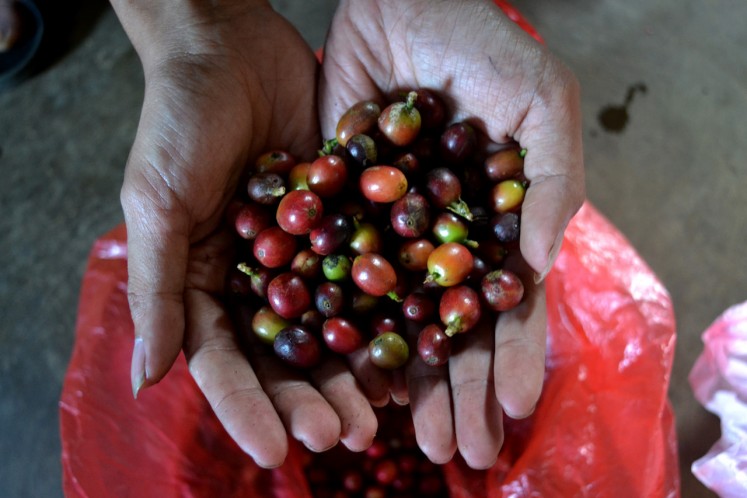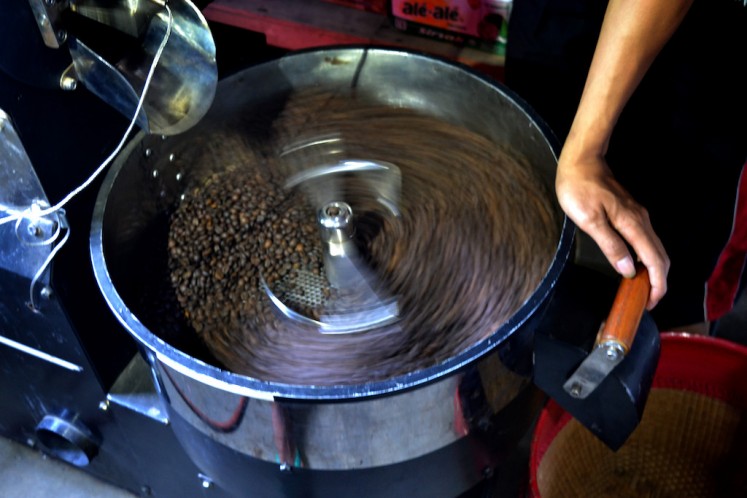Popular Reads
Top Results
Can't find what you're looking for?
View all search resultsPopular Reads
Top Results
Can't find what you're looking for?
View all search resultsThe rise of Lawu coffee among Java's single origins
Change text size
Gift Premium Articles
to Anyone
A
young man was busy checking the temperature of a coffee roasting machine. His name was Aprei Kurniawan, a coffee farmer from Jabung hamlet on the slopes of Mount Lawu, Magetan regency, East Java.
Aprei’s machine was assembled locally, and is able to roast up to three kilograms of coffee beans. While waiting for the machine to reach the required temperature, he sorted the green beans already prepared on a bamboo tray. The bad beans must be separated from the good ones.
Coffee agribusiness is the path Aprei chose in 2014, and two years later, to increase the selling point of his home-grown coffee, he established a coffee roasting house.
The so-called coffee roasting house is actually a humble room located next to Aprei’s home.
“Before the beans enter the roasting machine, I make sure again and again that the bad or small beans are left out. That way, I can maintain the good flavor of the coffee,” said Aprei.
He added that maintaining the consistency of the coffee's quality comprised the entire process from planting to harvesting to handling. Maintaining consistency is important, so beans can be marketed successfully in the long run. In the end, good sales will benefit his community.
“These days coffee connoisseurs and coffee shop owners choose their beans cleverly. I have no choice but to maintain quality in order to succeed in the single origin market,” explained Aprei while pouring beans into the roasting machine.
The young farmer became attached to the coffee of Jabung hamlet after marrying Sunarti, a Jabung native. His father-in-law, Suyatno, is a farmer who owns several plots of land planted with vegetables and coffee on the slope of Mount Lawu.
Lawu coffee was long underappreciated on the market, because local farmers did not know how best to plant, harvest and prepare the beans to ensure high quality.
Read also: In search of Indonesia's best-quality coffee
The next challenge
Farmers gradually learned that it was important to harvest the coffee cherries when they turned red, before carefully sorting them and handling them with the best full-washed or natural treatment processes afterward. The next challenge after this, however, was to promote their coffee on the market.
There was a time when Aprei struggled to sell coffee beans door to door, or desperately offered them to tourists at Sarangan Lake, which is quite far from his village.
His situation improved after he took up active roles in coffee communities in Magetan, Madiun, East Java, and Surakarta, Central Java. Lawu coffee started to become familiar among coffee lovers, and served as a single origin option at several coffee shops in Central and East Java.
In order to establish Lawu coffee as a strong brand, Aprei formed a communication forum with fellow coffee farmers in Magetan, including those on the western slope of Mount Lawu, particularly in Gondosuli village.
The forum provides a place where farmers can exchange and share knowledge and information about coffee processing, allowing Lawu coffee from different villages to achieve a similar standard in quality.
May to June are the busiest months for Aprei and Suyatno, as it is when their coffee plants enter the harvest period. From each harvest, they can gather up to 300 kilograms of Arabica coffee and 800 kilograms of Robusta coffee. Quantity and quality may differ in every harvest, depending on changes in weather and the intensity of pest attacks.
Arabica Lawu generally has a balanced acidity, with a hint of herbs. Meanwhile the Robusta Lawu is less full-bodied than the average Javanese robusta, and has a hint of chocolate.
Soil conditions and vegetation surrounding the coffee plants, and also the altitude and weather contribute to the distinct flavors of each single origin coffee.
At the end of the day, Lawu has enriched the wealth of Javanese coffee, and is a welcome addition to the many varieties already popular on the market such as Temanggung, Ambarawa Kelir, Merapi, Malang Dampit to name just a few. (mut)













